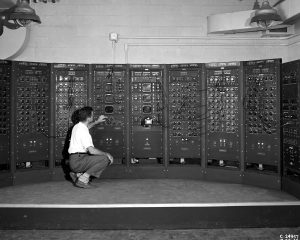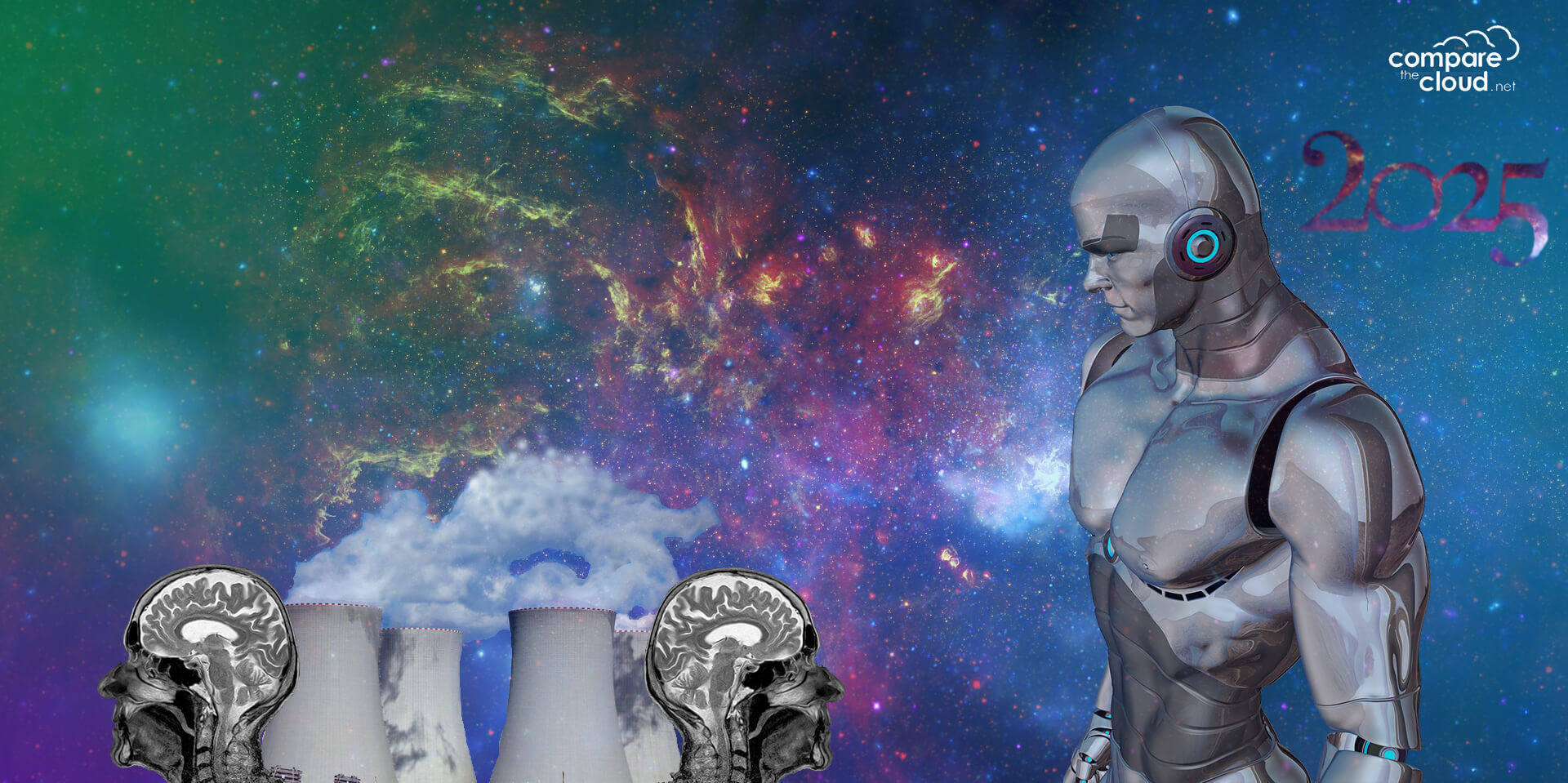It is easy to predict what is coming up for the next year but thinking further out is always a challenge. In this blog post I am going to look at advances made in 2015 that will impact us in 2025.
[easy-tweet tweet=”Daniel Thomas, Founder of @Comparethecloud speaks his thoughts on how developments of 2015 will relate to 2025″ via=”no”]
Quantum Computing

Impact in 2025
Quantum computing when put into full commercial use will allow for the solving of questions that have always eluded mankind. Whilst initially the technology will be seen as malevolent due to the ability to destroy current cryptology (although it solves this issue also) we will see more general use in 2025 akin to how we use devices today.
Brain 2 Brain Comms
Brain to Brain communication has already had a significant breakthrough in 2015 where two brains were linked for a question and answer experiment.
Impact in 2025
Is this the start of the Humanification we blogged about in 2013? How will our children learn in 2025? Will we see today’s education methods dismissed as archaic? Are we looking at the rise of education algorithms that teach according to the subject’s capacity to learn? Brain to Brain communications has the potential to disrupt all learning institutions and methods, all traditional education establishments would have to reevaluate their curriculums. Information on a subject or problem solving capacity would be instantly downloadable into the brain directly. How will this allow for a measure of intelligence? An example I use from 2015 is the question of should a child need to learn maths to an advanced degree when calculators and a plethora of devices already perform this function?
[easy-tweet tweet=”How will our children learn in 2025? Will we see 2015 education methods dismissed as archaic?” user=”comparethecloud”]
Nuclear Fusion
Nuclear technology is a much maligned and frowned upon source of energy. An example being the Japan earthquake receiving 10x more attention once the Fukushima reactor was in danger. Nuclear fusion is best described as the harnessing of sources as powerful as the sun. The advancement of this technology could revolutionise how we consume and manufacturer power.
Impact in 2025
The European Unions first reactor of the type is coming online in 2020 five years into this journey will we see alongside the use of Superconductors and miniaturisation of systems a dramatic change in how we power our data centres, homes and industrial units. Is this the first step towards a positive climate change revolution?
The Robot becomes our friend? (Or does it)
It is frankly amazing when you travel or speak with people from different cultures. An example being the Japanese who have always seen robotics as an aid and friendly advancement. My personal view is the difference in our generation has been the portrayal of Robotics. In Japan we have the friendly looking Honda Asimo, compare Asimo to the mean looking predator drones and destructive terminator robots we view in Western Cultures, with the destructive stereotype burned on our children’s brains by the continued growth of gaming consoles.
Impact in 2025
We already have robotic hoovers, robotic industrial workers and a robotic seal that comforts the elderly in japan (yes really). As Artificial Intelligence increases we will see the use of more ‘learning’ capability and automation and freedom of robotic ‘services’. Note I said ‘services’, it is my view that repetitive tasks such as domestic cleaning will be ‘service based’ the same way we order a taxi now. By this time drones would of become sufficiently robust and accurate to allow for home deliveries and automation of shopping services.
Q. Will robots be evil?
A. Are we talking about Robots or the artificial intelligence that drives them? This is the fundamental question we should ask.
Artificial Intelligence
Artificial intelligence has made significant leaps and bounds in 2015 mainly fuelled by the cheap abundance of computing resource, miniaturisation of devices delivering more power and soon the introduction of commercial Quantum computing. Big data and analytics have also been significant investment growth opportunities couple with machine learning it means 2015 has left us with the building blocks for advancement in human history like no other time since the industrial revolution and electrification of industries.
[easy-tweet tweet=”Artificial intelligence has made significant leaps and bounds in 2015″ user=”comparethecloud” hashtags=”AI”]
Impact in 2025

In 2025 what we will see is a destruction of any industry that relies on a repetitive task such as accountancy or medical AI will be the ‘brains’ behind all our devices all of our choices all of our health services and above all our social views. The issue with such a thing is that we believe everything and trust whatever is ‘on our screens’ as humans we will need to use our intellectual capacity to move beyond ‘acceptance’ to challenging.
The question that I ponder is this, AI and its mechanical cousin robotics to be truly aligned to human capability requires the one thing that during this Christmas s time we all possess ‘Humanity’. Humanity, thoughts, feelings and emotions will never be replicated until humans become a ‘hybrid’ with machines.
I believe in 2025 that we will advance legacy technologies from 2015 such as pacemakers, ingestion tablets and other areas but will not be ready until 2035 for the true singularity by this time protections would be put in place.
[easy-tweet tweet=”Humanity, thoughts, feelings and emotions will never be replicated until humans become hybrid with machines”]
What will our homes look like in 2025?

Therefore every device we own will be ‘smart’ from the TV we watch to the earpiece we wear. Our interaction will be seamless thought controlled and tuned to our every whim and need by smart algorithms that run our lives.
The biggest cause of waste and loss in any environment is the ‘friction’ between objects. Imagine if the Japanese bullet train was powered in a vacuum on magnetic rails with no friction? Our homes and device could harness this centuries old magnetic technology to provide effortless moving of devices and heavy objects. Add to this the embryonic advances in graphene and nanotubes and molecular based engineering, could we have self forming objects crafted and formed in minutes in front of our eyes.
“For each of our actions there are only consequences.”
As we move into 2016 let us all look back at what has been from a technology standpoint, one of growth but still one of unfulfilled promise. Maybe in 2025 I could look back at this article and laugh at its inaccuracies, remember though when cinema was first displayed people ran out of the theatre thinking the train was going to hit them.
Predicting the future is not easy but then neither is looking at the past. My final quote is from British Scientist James Lovelock, an unsung national treasure.
“For each of our actions there are only consequences.”
And last but not least a big thank you to those that inspire me, the team at Compare the Cloud, Simon Porter, Ian Jeffs, Andy Johnson, Rob Davies, Matt Lovell, Doug Clark, Omer Wilson, Michael Andrew-Foote, Gordon Davey, David Fearne and Alan Baxter a Secondary School teacher who forced a loud unruly dyslexic child to make circuit gateways during numerous detentions (you’re my hero).




